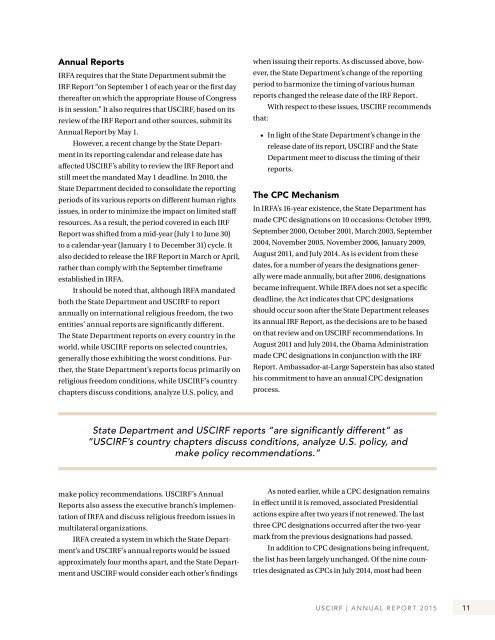USCIRF Annual Report 2015 (2)
USCIRF Annual Report 2015 (2)
USCIRF Annual Report 2015 (2)
You also want an ePaper? Increase the reach of your titles
YUMPU automatically turns print PDFs into web optimized ePapers that Google loves.
<strong>Annual</strong> <strong>Report</strong>s<br />
IRFA requires that the State Department submit the<br />
IRF <strong>Report</strong> “on September 1 of each year or the first day<br />
thereafter on which the appropriate House of Congress<br />
is in session.” It also requires that <strong>USCIRF</strong>, based on its<br />
review of the IRF <strong>Report</strong> and other sources, submit its<br />
<strong>Annual</strong> <strong>Report</strong> by May 1.<br />
However, a recent change by the State Department<br />
in its reporting calendar and release date has<br />
affected <strong>USCIRF</strong>’s ability to review the IRF <strong>Report</strong> and<br />
still meet the mandated May 1 deadline. In 2010, the<br />
State Department decided to consolidate the reporting<br />
periods of its various reports on different human rights<br />
issues, in order to minimize the impact on limited staff<br />
resources. As a result, the period covered in each IRF<br />
<strong>Report</strong> was shifted from a mid-year (July 1 to June 30)<br />
to a calendar-year (January 1 to December 31) cycle. It<br />
also decided to release the IRF <strong>Report</strong> in March or April,<br />
rather than comply with the September timeframe<br />
established in IRFA.<br />
It should be noted that, although IRFA mandated<br />
both the State Department and <strong>USCIRF</strong> to report<br />
annually on international religious freedom, the two<br />
entities’ annual reports are significantly different.<br />
The State Department reports on every country in the<br />
world, while <strong>USCIRF</strong> reports on selected countries,<br />
generally those exhibiting the worst conditions. Further,<br />
the State Department’s reports focus primarily on<br />
religious freedom conditions, while <strong>USCIRF</strong>’s country<br />
chapters discuss conditions, analyze U.S. policy, and<br />
when issuing their reports. As discussed above, however,<br />
the State Department’s change of the reporting<br />
period to harmonize the timing of various human<br />
reports changed the release date of the IRF <strong>Report</strong>.<br />
With respect to these issues, <strong>USCIRF</strong> recommends<br />
that:<br />
• In light of the State Department’s change in the<br />
release date of its report, <strong>USCIRF</strong> and the State<br />
Department meet to discuss the timing of their<br />
reports.<br />
The CPC Mechanism<br />
In IRFA’s 16-year existence, the State Department has<br />
made CPC designations on 10 occasions: October 1999,<br />
September 2000, October 2001, March 2003, September<br />
2004, November 2005, November 2006, January 2009,<br />
August 2011, and July 2014. As is evident from these<br />
dates, for a number of years the designations generally<br />
were made annually, but after 2006, designations<br />
became infrequent. While IRFA does not set a specific<br />
deadline, the Act indicates that CPC designations<br />
should occur soon after the State Department releases<br />
its annual IRF <strong>Report</strong>, as the decisions are to be based<br />
on that review and on <strong>USCIRF</strong> recommendations. In<br />
August 2011 and July 2014, the Obama Administration<br />
made CPC designations in conjunction with the IRF<br />
<strong>Report</strong>. Ambassador-at-Large Saperstein has also stated<br />
his commitment to have an annual CPC designation<br />
process.<br />
State Department and <strong>USCIRF</strong> reports “are significantly different” as<br />
“<strong>USCIRF</strong>’s country chapters discuss conditions, analyze U.S. policy, and<br />
make policy recommendations.”<br />
make policy recommendations. <strong>USCIRF</strong>’s <strong>Annual</strong><br />
<strong>Report</strong>s also assess the executive branch’s implementation<br />
of IRFA and discuss religious freedom issues in<br />
multilateral organizations.<br />
IRFA created a system in which the State Department’s<br />
and <strong>USCIRF</strong>’s annual reports would be issued<br />
approximately four months apart, and the State Department<br />
and <strong>USCIRF</strong> would consider each other’s findings<br />
As noted earlier, while a CPC designation remains<br />
in effect until it is removed, associated Presidential<br />
actions expire after two years if not renewed. The last<br />
three CPC designations occurred after the two-year<br />
mark from the previous designations had passed.<br />
In addition to CPC designations being infrequent,<br />
the list has been largely unchanged. Of the nine countries<br />
designated as CPCs in July 2014, most had been<br />
<strong>USCIRF</strong> | ANNUAL REPORT <strong>2015</strong> 11


